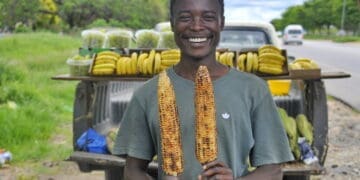Johannesburg-based entrepreneur Collins Nwamadi, CEO of Newaves, believes the African Continental Free Trade Area (AfCFTA) is creating new opportunities for small businesses to grow beyond South Africa’s borders.
His company exports fruit and other locally made products to international markets and runs a freight and forwarding service that helps clients move goods efficiently. He said small exporters like him are eager to see the AfCFTA remove trade barriers and make it easier to do business across Africa.
“The agreement connects us as Africans. It gives small companies a chance to export, to learn, and to grow,” he said.
He said one of the biggest challenges for small exporters is getting access to products and markets.
“Sometimes farmers or manufacturers already have contracts with large clients, so small exporters are left out. And when we do get an order, banks often make it hard to access funding to complete it,” he said.
Despite these challenges, Nwamadi remains confident that the AfCFTA will help businesses like his expand across the continent.
AfCFTA aims to create a single African market by removing tariffs and trade barriers between 54 countries. Once fully implemented, the agreement will make 97% of goods duty-free by 2035, enabling easier trade in goods and services, digital trade, investment, and intellectual property across Africa.
South Africa’s trade with other African countries continues to grow. In 2024, exports to Africa reached R571 billion, accounting for 28% of South Africa’s total exports. Under the AfCFTA, exports beyond the Southern African Development Community (SADC) increased to R1.3 billion between January and July 2025, mainly to Ghana and Kenya.
One entrepreneur preparing to take advantage of these opportunities is Naledi Mkase, founder of Makoya Adhesive, a manufacturing company based in Randburg. Her business produces a multi-purpose glue that sticks on almost any surface except human skin.
“People get frustrated with glues that stick to their fingers,” Mkase said. “Our innovation solves that it works on everything from wood to granite and even helps bond paint for a long-lasting finish.”
Makoya Adhesive, founded in 2017, employs 14 people and currently supplies its products to Makro, Build It, DIY Depot, and Leroy Merlin’s online store. Mkase said her company has already registered for export and is preparing to expand into other African markets.
“The AfCFTA gives us hope that it will be easier for small manufacturers like us to sell in other parts of Africa,” she said. “We are competing with long-established international brands, but with fair trade rules, we can grow.”
basetsana@vutivi.co.za
























































